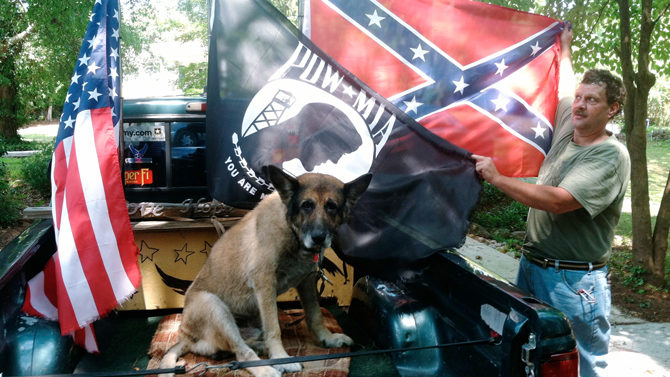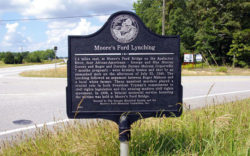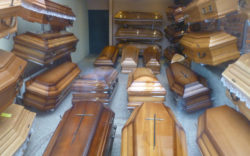Pro life. Pro choice. Pro Obama. Pro Romney. Pro chicken. Pro zombie: people with something to say usually paste stickers to their bumpers and leave it at that. Not Matthew Barrick. He needs more than the back of a car for his message. He needs an entire truck.
Matthew and his green pickup are impossible to miss, thanks to the three regulation-sized flags on poles welded to his truck’s bed. When he gets up to 30 mph, the flags stream out behind him, and then he’s the vanguard of his own parade: the Stars and Bars, the black POW/MIA and, of course, Old Glory. The edges of the truck’s bed are rimmed with the rope lights you’d see at the skating rink, and this gives the outfit a disorienting sense of whimsy, as though you’d encountered a hardcore militia member who also loves disco.
When I met Matthew in the parking lot of the Alps Kroger and asked him to tell me his story, he hitched up his camouflage britches, ran his hand through his curly red hair and bashfully looked at the ground.
“I’ll have to tell momma,” said this 40-something man, “she’ll be tickled.”
Matthew lives with his elderly mother in the Five Points house he grew up in. A disability prevents him from working, so he spends his days tinkering with his truck, setting up a large army tent in the backyard and running to the store for his mother’s medications. He is a gentle, unassuming person with watery blue eyes and an aversion to looking straight at you. I was expecting an angry man full of grievances about the state of this country and the federal government and mandated health care and welfare recipients. I was not expecting Matthew. But he surely was expecting me.
“I laid out all my flags for you,” he said excitedly, pointing at the dining room table. Twenty-four carefully rolled-up flags were arranged in a mandala around a burning candle. “These are the ones that are too worn to fly anymore. They’re retired. Would you like to sit down? Would you like a drink of water?”
We sat on a sunny screened porch and began our conversation. Outside, five giant flags fluttered on poles in the yard.
“Are those the branches of the military?” I asked.
“Yep. The Coast Guard needs to be replaced.”
I wasn’t sure if he meant the flag or the actual Coast Guard itself, so I hurried on, asking him why he decided to turn his truck into a mobile color guard.
“It was 9-11,” he said simply, then sat back, satisfied.
“9-11 upset you?”
“It sure did. Something needs to change in this country.”
“Like what?”
“Well. Like the schools. I went to school,” he shook his head. “It was hard. I had to quit. Kids need a safe haven. And then the alcohol sales.”
“You think they need more or fewer alcohol sales?” I asked.
“The way they serve it, it needs to be contained. You go to one store, drink too much and get thrown out, then you go to another store and drink too much there. College kids just running all over the place.”
“OK,” I said,”But back to these flags. What do your neighbors think about all this? They ever say anything to you about it?”
“Naw. I’ve lived here all my life. They know me. The town people, too. They just come up and say, ‘I wish there were more like you.'”
“You never get any negative feedback at all from anyone?”
Matthew squinted. “Maybe once in a while someone will say something. But I don’t even know what they’re saying. I think they’re just drunk or something. You just gotta take it as you see it.”
“OK, well, you know, you can be a patriotic American and support the troops and all that and still have a problem with the Southern flag. For instance, a lot of black people get reminded of slavery when they see it, and they don’t like that. A lot of white people, too. It upsets a lot of people.”
Matthew tilted his head and looked up at me out of the corner of his eye, like surely I was joshing.
“Well, I got these colored neighbors; they’re always going to the hospital. They got no car, so I always carry them.”
“They ride with you in your truck? With the flags? What do they say?”
“They just laugh and pat me and say, ‘It’s all right, Matthew, you just fly those flags. It’s all right.'”
“And what do you think this means?”
“I think it means it’s the worst war this country ever fought. The worst war ever.”
“No, I mean… â€
Remembering one of the main reasons I dropped out of journalism school, I jumped in. “Maybe the fact that your neighbors are OK with it is because when you don’t know a person up close, it’s easy to say that they are crazy or racist or something. But when you get to know people as individuals, you see that it’s more complicated than you thought. You know the real person.”
“Yep,” Matthew nodded, “That’s what it means.”
“What do you do besides take care of your mom and drive your truck?”
“I knit.”
“You knit?”
“Yep. I can show you, but I’ll have to go down into the basement.”
Matthew disappeared, and while he was gone I looked around the living room of the tidy house. On the mantelpiece were dozens of framed photos of family members: brothers and uncles and grandsons with smiling wives and happy children. Nearly all of the men were in uniform. There were no pictures of Matthew. I wondered whether, if every male member of Matthew’s family were an accountant, Matthew would be driving a truck plastered with Excel spreadsheets and IRS tax forms.
Matthew came back upstairs toting a huge box. Inside was a partially knitted Confederate flag the size of a large living room rug.
“What will you do with this when you’re done?” I asked.
“I don’t know. I guess start on another one.”
We walked out in the front yard so I could photograph Matthew next to his truck. He was adamant that his dog, a graying German Shepherd, be included in the shot and worried over whether or not to remove his hat. He displayed the flags proudly and from every angle, always asking, “Can you see the dog? Should I take off my hat?” He was polite and accommodating and overjoyed that someone finally took an interest in his life’s passion. I realized with a sort of dread that this article would not be an easy one to write.
I don’t like nationalism or patriotism or racism or gratuitous displays of anything. I don’t like symbols that divide us and make other people feel bad. I don’t like people who put America first and their neighbors second. But I did like Matthew. And so, Matthew, if you’re reading this, I’m just going to tell you to keep flying your flags. It’s all right, Matthew. It’s all right.
Like what you just read? Support Flagpole by making a donation today. Every dollar you give helps fund our ongoing mission to provide Athens with quality, independent journalism.









